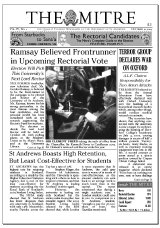
 The Mitre is the quality student newspaper at the University of St Andrews, the third-oldest university in the English-speaking world... more All correspondence should be sent to themitre@gmail.com. Editions of the Mitre generally are available online one month after they appear in print... more |
L E T T E R S T
O T H E E D I T O R Christ and Multiculturalism  SIR - I
would like to add my humble two cents to the wonderful editorial
'Multiculturalism, Move On' (The Mitre,
February 15, 2005). I wholeheartedly agree that multicultu-ralism, as
one would know it today, is one of the most destructive elements to
come out of twentieth-century secularism, and the question at its heart
is not a new one. It has been asked a million times in centuries past -
It is just the answers that are different. SIR - I
would like to add my humble two cents to the wonderful editorial
'Multiculturalism, Move On' (The Mitre,
February 15, 2005). I wholeheartedly agree that multicultu-ralism, as
one would know it today, is one of the most destructive elements to
come out of twentieth-century secularism, and the question at its heart
is not a new one. It has been asked a million times in centuries past -
It is just the answers that are different. Missionaries to the Far East in the mid-16th century were fascinated by the cultures they discovered, and struggled with how to spread the Gospel of our Lord most effectively to those people. A humanist today would more likely take offence to any suggestion that implied Christianity was truth and Buddhism is not. One need only briefly survey 18th century philosophy to see how the answer to the question "How does one interact with another culture?" has changed so drastically, and unfortun-ately the ‘humanistic’ approach is ever so dominant today. The question now at hand is how to move away from the destructive multiculturalism to a healthy one as envisaged by early missionaries. This is a question as yet unanswered (and some might say unasked). However there is one good starting point: drama. A brief glance at the mainline cinema listings during the summer gives a good idea of what people are seeing. For the most part, it is (for lack of a better word) excrement. Literature and cinema are a significant factor in forming and changing the way people think. And unless the taboos strictly enforced by modern multiculturalism on the popular literature and cinema of the day are broken, the greater public will forever be trapped in what Henri du Lubac, S.J. called 'the drama of atheist humanism.' It is this drama that stands in the way of a multiculturalism that celebrates the diversity of the person and of the world, but is not afraid to offer them the promise of salvation through our Lord Jesus Christ. Mr. Timothy Allen Tertian, St. Mary’s College Vol. III, No. 6, June 24, 2005 Please send all letters to the editor to: themitre@gmail.com. Letters may be edited for size, grammar, and content. Those who wish to remain anonymous must provide their real name and address to the editor. Return to Index T
H E M I T R E
THE QUALITY STUDENT NEWSPAPER AT THE UNIVERSITY OF ST ANDREWS |
C
O N T E N T S Home About Archives Literary Review On the Mitre: "Its frenetic tone is amusing in a relentless, unpitying way that reminds me of 'Vile Bodies'." Fr.
John Emerson
Regional Superior, FSSP |